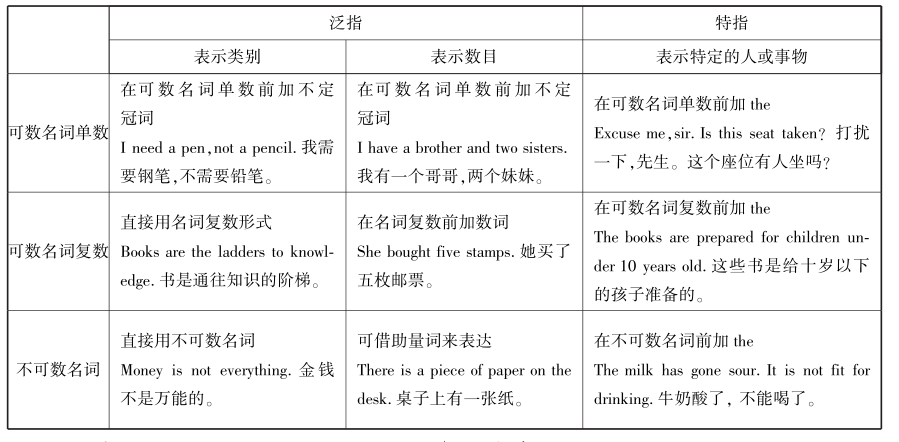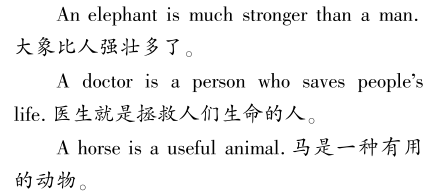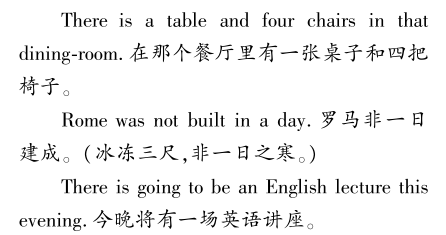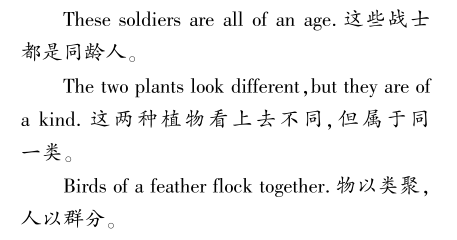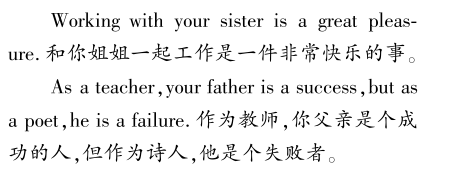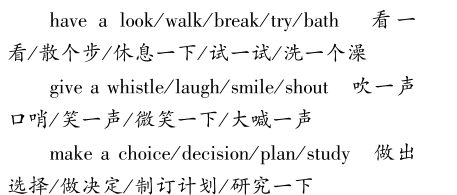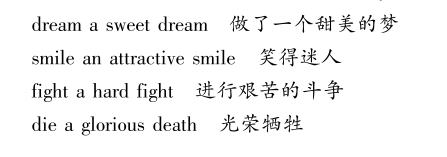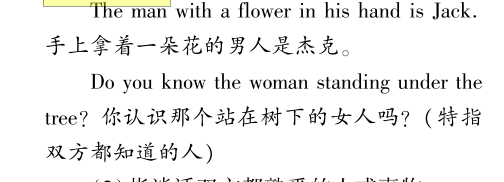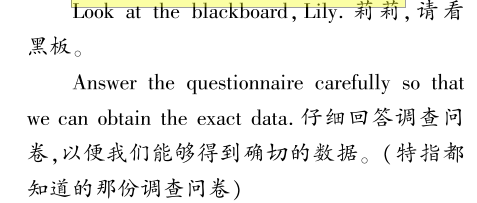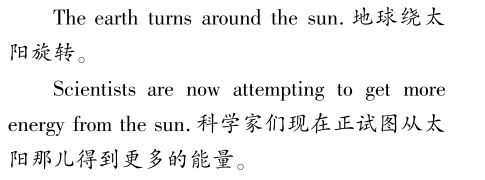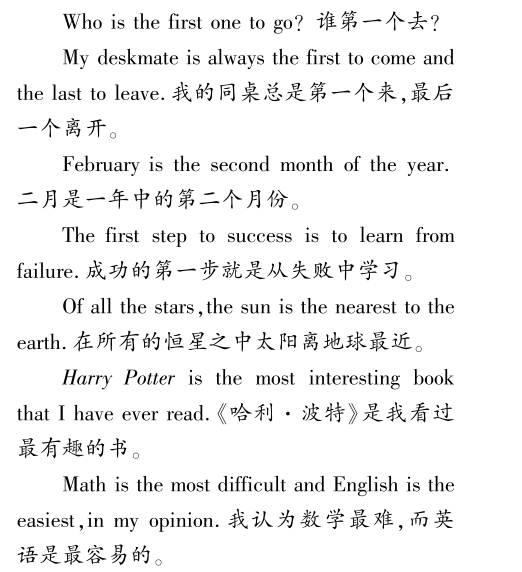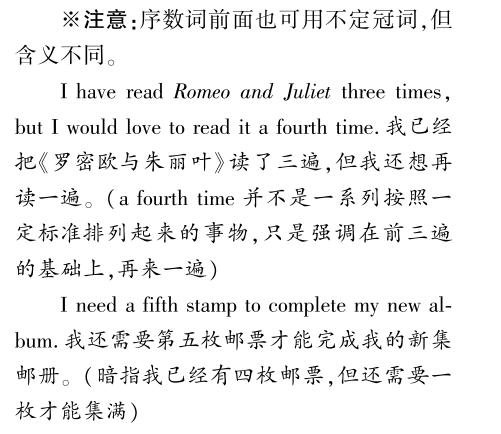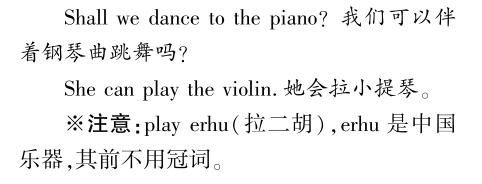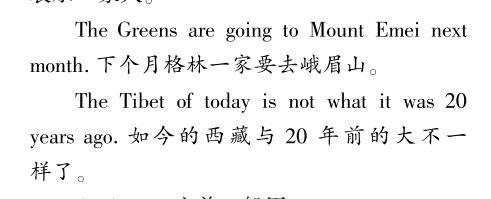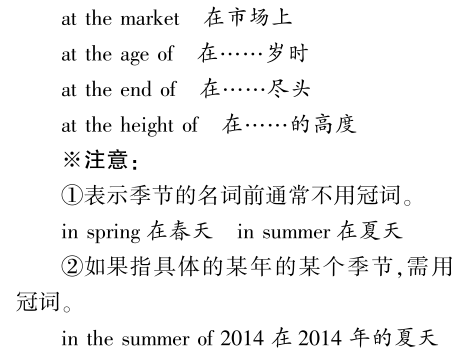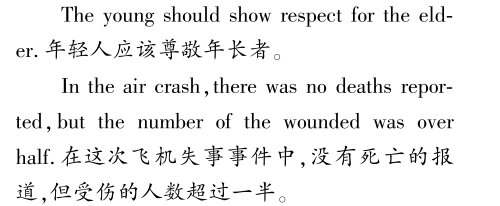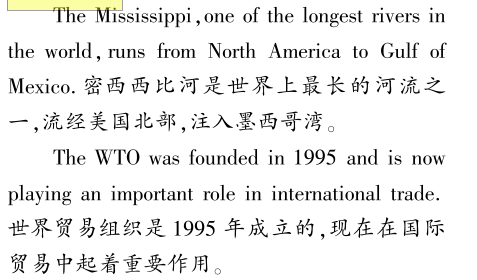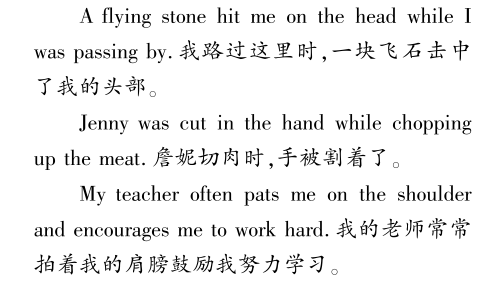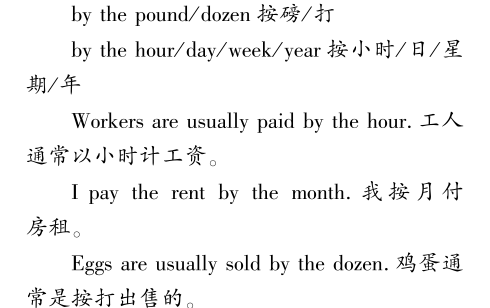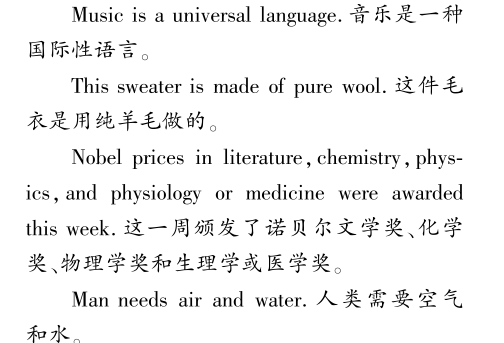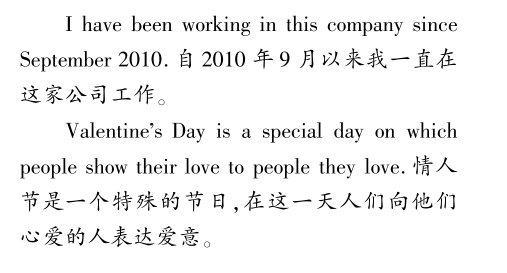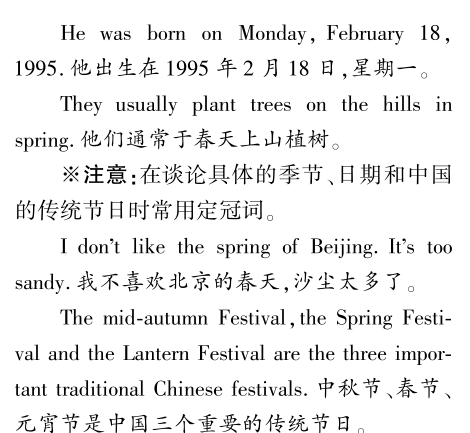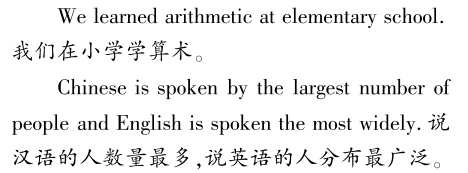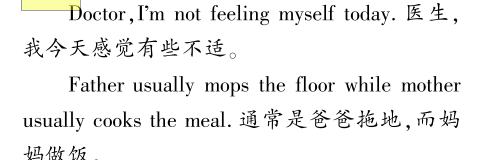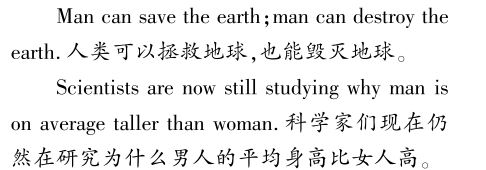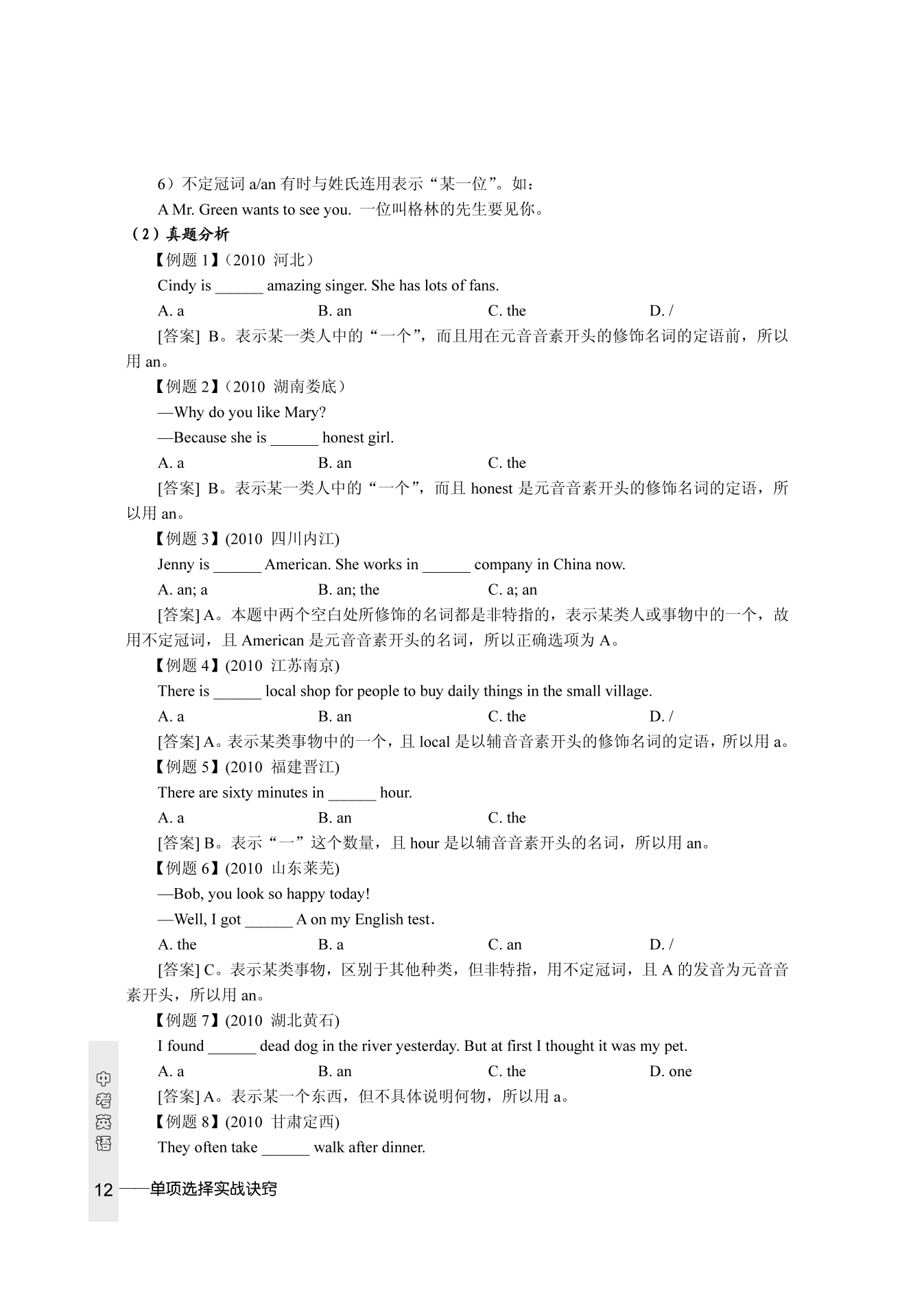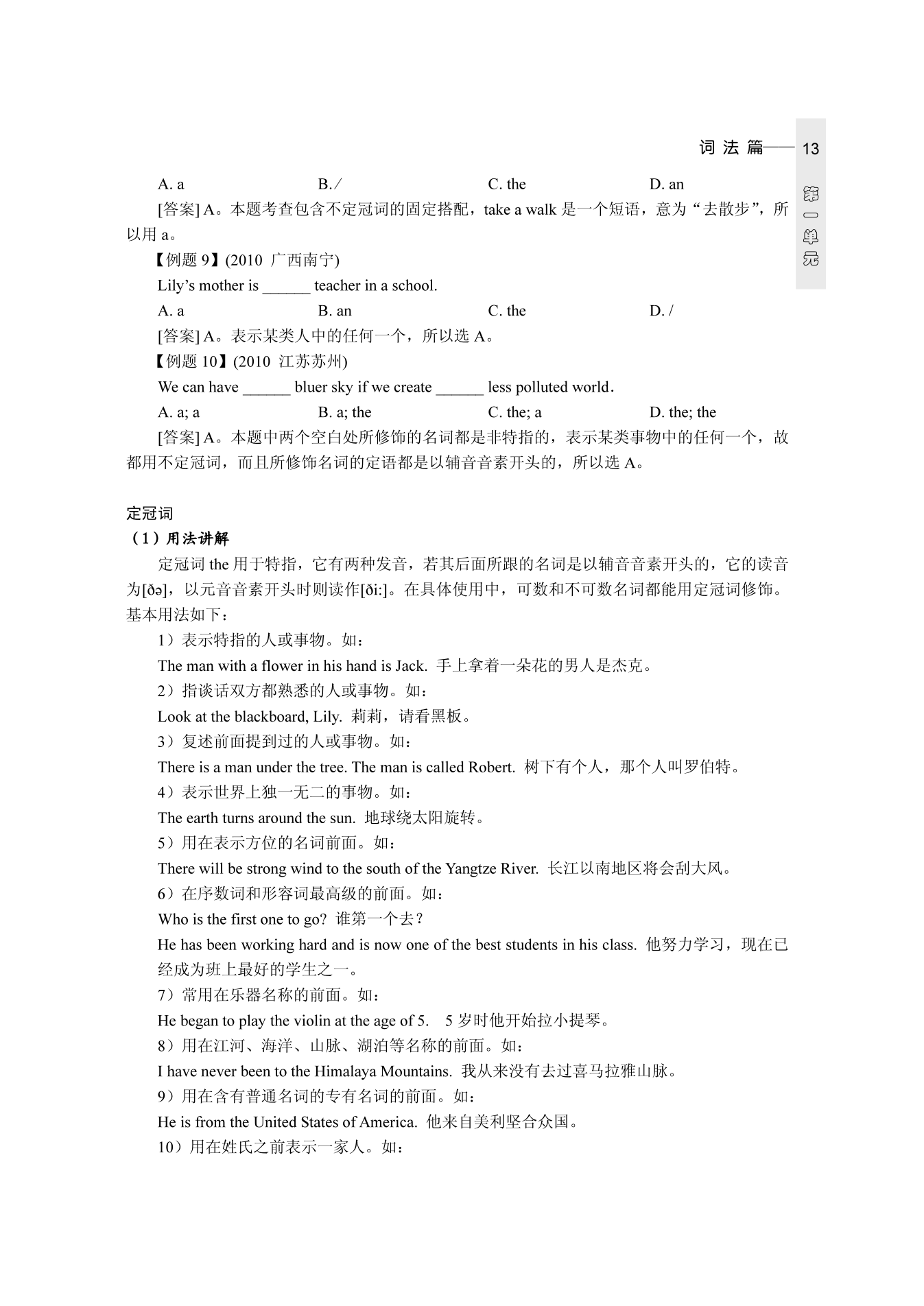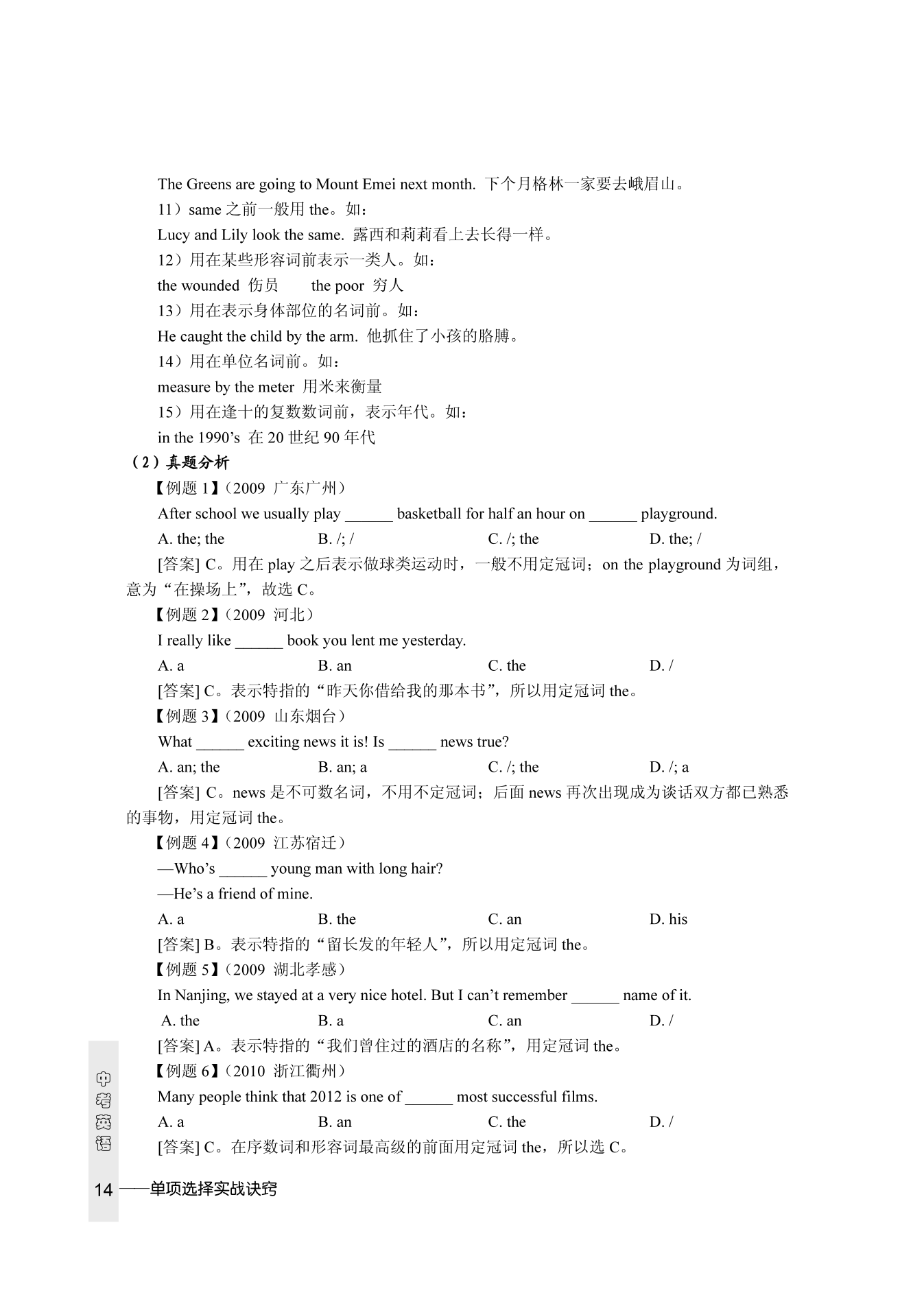
冠词
冠词是虚词,本身不能单独使用,没有词义,只能用在名词的前面,帮助指明名词的含义。
对于冠词的学习,应从以下几方面切入:
(1)冠词的一般用法与特殊用法相结合。如:表示世界上独一无二的事物时常加定冠词 the,但若其前面有形容词或限定词修饰时,常用不定冠词。 (2)冠词的学习与名词的学习要相结合。 如:单数可数名词表泛指“一”的概念时,其前需要加不定冠词,而表示特指时要加定冠词。 (3)一般用法与习惯用法、特殊含义相结合。 如:有些抽象名词前不加不定冠词表示具体含义;名词前使用冠词和不使用冠词,意 义差别很大。
1. 不定冠词
不定冠词 a/ an 用在单数名词的前面,a用在辅音开头的词前面,an 用在元音开头的词的前面。 [不定冠词的基本用法] (1)表示某一个人或东西,但不具体说明何人或何物,表示泛指。
(2)表示某类人或事物,以区别于其他种类。 该用法并不表示具体的某一个人或事物,而是指一类人或事物,一般不译为“一”。
(3)表示某类人或事物中的任何一个。
He is a teacher of English. 他是英语教师。
(4)表示“一”这个数量。
(5)表示单位时间内的频度,含有“每”的概念,在正式文体中用 per 代替不定冠词。
(6)表示“相同的”
(7)用于集体名词、物质名词、抽象名词、专有名词前。
①集体名词前。②物质名词前。 如 coffee、food、tea、fruit、fog、rain、snow、wind 等,在表示“一种、一杯、一场”等之意时,常加不定冠词。
Mary and John are a happy couple. 玛丽和约翰是一对快乐夫妻。
③抽象名词前。 当抽象名词表示具体的人或事物时,前面可以加不定冠词。
④专有名词前。
Many young people want to be a Bill Gates.
许多年轻人想成为比尔·盖茨式的人物。(8) 用于不可数名词前。 如 education、history 等在表述其某一部分或某一方面的内容、概念时,前面常加不定冠词。
(9)用于动词短语中。 具有动作意义的名词在与动词 have、take、make、give 等构成短语,表示一种短暂性的动作时,此名词前的不
定冠词一般不可缺少。
(10)用于同源宾语前。 在同源宾语中,与动词“同源”的名词前一般要加不定冠词。
(11)几个用不定冠词的习语:a bit(一点),a little(一点),a few(几个),a lot(许多),a kind of(一种),a pair of(一副、一双),a number of(大量的),a piece of(一张), half an hour(半小时),have a good time(玩得开心),have a cold(感冒),make a noise(发出嘈杂声),have/ take a rest(休息一会儿), a great deal(大量),in a moment(立刻),in a hurry(急匆匆地),catch a cold(感冒)。
定冠词 the
定冠词的基本用法:
(1)表示特指的人或事物。 这种用法可
以表示上文提到的且谈话双方明确的人或事 物,也可指上文未提到过但谈话双方都知道 的人或事物。
(2)指谈话双方都熟悉的人或事物
(3)复述前面提到过的人或事物。
(4)表示世界上独一无二的事物。 世界
上独一无二的东西很多,这里所指的独一无 二主要是指各种天体及世界上比较有影响的事物。
5)用在表示方位的名词前面。
(6)用在序数词和形容词最高级的前面。
(7)常用在乐器名称的前面。
(8)用在江河、海洋、山脉等名称的前面。
(9) 用在含有普通名词的专有名词的前面。
(10)用在人名或地名前,用在姓氏之前
表示一家人。
(11)same 之前一般用 the。
(12)表示地点、方向、时间、方式等。
(13) 用在“the more. . . ,the more. . . ”结
构中。The more we offer, the more we often get.
我们付出的越多,往往得到的也越多。(14) 用于形容词或分词前。 有些形容
词或分词前面加上 the,相当于一个名词,可 表示一类人或事物。
(15) 几个用定冠词的习语:at the same
time (与此同时),make the bed(铺床),in the end(最后),all the time(一直),by the way(顺 便说一下),on the way(在路上)。(16) 用于集体名词、物质名词、专有名
词前。 ①用于集体名词前,表示某个集体中的 全部。
②用于物质名词前,表示具体的有别于
其他的物质。 Strike the iron while it is hot. 趁热打铁。③用于专有名词前,普通名词构成的专
有名词前往往要加 the,但也有一些特例;有 的专有名词不是由普通名词构成的,有时也 需要加 the。
17)固定结构“动词 + sb. + 介词 + the
+ 某一部位”。常见 的 此 类 动 词 有 take、 catch、 hold、
seize、pull、hit、cut、strike、pat、lead 等。 常见的 介词有 in、on、by 等。 一般说来,表示“抓住, 领着”用介词 by,表示“击中,击打”较硬且突 出的部位用 on,较软且陷入的部位用 in。
(18)用于“by + the + 计量单位名词”。
(19)习惯用法
①常用定冠词的地名、组织名等。 the Alps 阿尔卑斯山脉 the Summer Palace 颐和园 the Arctic Circle 北极圈 the Axis 轴心国 the Changjiang River 长江 ②常用定冠词的习惯短语。 all the time 一直 all the year round 一年到头 at the age of 在……岁时 at the same time 同时 in the middle of 在……的中间 in the day 在白天 at the beginning/ end of 在……开始/ 结束时 at/ on the corner of 在……的角上 at the back of 在……后边 all the best 一切顺利 break the law 触犯法律 by the way 顺便说一下 go to the cinema 看电影 in the darkness 在黑暗中 in the habit of 有做……的习惯
零冠词
零冠词主要指不用冠词的情况,不包括 冠词省略的情况。 (1)某些物质名词、抽象名词、专有名词 前和(第一次使用)一些不可数名词前面通常 不用冠词。
2)名词前已有指示代词、物主代词或不
定代词作定语时不用冠词。 My pen is much more expensive than yours. 我的钢笔比你的昂贵多了。 (3)日期、节日、周名、月名或季节名前一 般不用冠词。
(4) (第一次使用)复数名词表示人或事
物的类别时不用冠词。 Men are cleverer than monkeys. 人比猴子 聪明。 (5)三餐饭前不用冠词。 We have breakfast at home and lunch at school. 我们在家吃早饭,在校吃午饭。 (6)球类名词前不用冠词。 The children play football on Saturday after⁃ noons. 孩子们星期六下午踢足球。(7)城市的重要建筑物名称前不用冠词。 They are now at People?s Cinema. 他们此 刻在人民电影院。 (8)表示学科、语言的名词前不用冠词。
(9)表示职位、头衔、称呼的名词前不用
冠词。
George Smith was just assigned president of
the company. 乔治·史密斯刚刚被任命为公 司总裁。 (10)man 泛指“人类”时,前面不用冠词。
(11)由介词或连词连接的两个相同、相
对或关系密切的名词组成的一些固定词组中 通常不用冠词。arm in arm 胳膊挽着胳膊
day and night 日日夜夜 day after day 日复一日地 day by day 一天天地 face to face 面对面地 hand in hand 手拉手地 heart and soul 全心全意地(12)习惯用法。
①与时间、地点、方式或状态有关的一些 词组中,不适用冠词。at best 充其量
at bottom 实际上 at breakfast 早餐时 at Christmas 在圣诞节 at college 在上大学 at cost 按成本 at dark 在天黑时 at dawn 在拂晓时 at dinner 吃正餐时 at first 起初 at first glance/ sight 乍一看 at first hand 第一手 at first thought 乍一想 ②在一些动词短语中,习惯上不用冠词。 ask for advice 征求建议 ask for help 寻求帮助ask for trouble 找麻烦
catch fire 着火 come back to life 苏醒 come to power 掌权 catch sight of 无意中看见 do good/ harm/ wrong to 对……有好处/ 害处/ 不公平 ③as/ though 引导的倒装结构中,如果是 名词放于句首,习惯上不用冠词。 Boy as/ though he is,Justin has travelled to quite a few countries. 尽管贾斯廷还是个孩子, 他已经游览过很多国家。 ④一个人兼多个身份时,只在第一个名 词前加冠词,其他几个不再加冠词。 但若指 不同的人则需要加上冠词。a worker and writer 工人兼作家
a worker and a writer 一个工人和一个作 家 ⑤系动词 turn 后如有名词时通常不用 冠词。 Margery turned dancer as she expected. 马 杰里如自己所愿成了舞蹈家。 ※注意:有些短语不用冠词和使用冠词 意义迥然不同。 at table 在吃饭 at the table 在桌子旁 { at school 在上学 at the school 在学校 { by day 白天 by the day 按日计算 { in hospital/ prison 住院/ 坐牢 in the hospital/ prison 在医院里/ 在监狱里 { in charge of 掌管 in the charge of 在……掌管之中 { in future 今后,往后 in the future 在将来 { in place of 取代 in the place of 在……位置上 { in front of 在……(外部)的前面 in the front of 在……(内部)的前面 { in office 执政 in the office 在办公室里 { out of question 毫无疑问 out of the question 不可能 { take place 发生 take the place of 取代 { have a word with 与……交谈 have words with 与……吵架 { go to bed 上床睡觉 go to the bed 朝床边走去 { (13)一些习惯用语中不用冠词。 at / to / from / out of / after / for school in / to / for / after class in / to / out of / into bed after / at/ from / out of / to work at / to sea in / from / down / to town at / from home at / for / to breakfast/ lunch/ supper at night/ noon/ midnight on foot go to school/ bed on top of in front of on show/ display/ duty/ watch in / out of hospital at all on/ in time at first/ last/ once in Chinese/ English take care of 4. 冠词的位置 (1)冠词常用于名词或名词短语前。 a costly trip 一次花费较多的旅游 an outstanding doctor 一位医术高明的医the happiest time 最幸福的时光
the everlasting friendship 永久的友谊 (2)as/ such/ so. . . as. . . 结构。 这种结构中的冠词位于 as/ so 修饰的形 容词后,名词前;在 such 结构中,冠词紧跟在 such 后。 I have never spent as delightful a time as this Sunday. 我从未过得像这个星期天一样这 么开心。 Jennifer is not so smart a girl as I thought. 珍妮弗不是一个像我想象中那么机灵的 女孩。 The child has such a sweet voice as a night⁃ ingale. 这孩子有一副像夜莺般婉转的歌喉。 (3)as/ though 引导的倒装让步状语从句 中。 在这种倒装的让步状语从句中,当表语 是带有形容词的名词时,不定冠词放在形容 词后。 Careful a person as she is,she can make mistakes. 尽管她是个细心的人,但她也会犯 错误。 Brave a man though he is,he trembles at the sight of snakes. 尽管他很勇敢,可看到蛇时 他还是发抖。 (4) such/ so. . . that. . . 结构。 冠词用于 such 后,形容词前;用于 so 修饰的形容词后。 Pollution is such an intractable problem that it takes a long time to get rid of it. 污染是一个 非常棘手的问题,需要很长时间才能清除。 The teacher set so difficult a question that none of us could work it out. 老师出了一个难 题,我们都做不出来。 (5)too. . . to. . . 结构中,冠词置于 too 修 饰的形容词之后。 Kevin is only too willing a boy to help those in trouble. 凯文非常乐于帮助那些困境中 的人。 This is too hard a situation to cope with. 这 是一个太棘手而无法应付的情况。 (6)rather、quite 修饰的名词短语中。 冠 词在有 rather、quite 修饰的名词或名词短语 中,位置比较灵活。 a rather/ quite cozy house = rather/ quite a cozy house = rather/ quite cozy a house 一座相 当舒适的房子 ※注意: ①quite 不修饰形容词,只修饰名词时,冠 词只能置于 quite 后。 Our math teacher is quite a character. 我们 的数学老师真是有点与众不同。 ②在 quite/ rather a few,quite/ rather a little 等短语中,由于 a few、a little 是固定短语,不 可拆开变成 a quite/ rather few、a quite/ rather little。 (7)what/ how 引导的感叹句中。 由 what 和 how 构成的感叹句中,冠词置于 what 后或 how 修饰的形容词后。 What a splendid performance you gave us! 你的演出多么精彩啊! How challenging a task it is to go through the forest within half a month! 在半个月内穿 越森林是多富有挑战性的一项任务啊! (8)定冠词 the 置于 all、both、double、twice 等词后的名词前。 All the information is true. 所有的信息都 是真的。 Both the parents are interested in music. 父 母都对音乐感兴趣。 I offered him double the amount,but he still refused. 我给他双倍价钱,但他还是拒绝了。
2017/7/24
考点:

